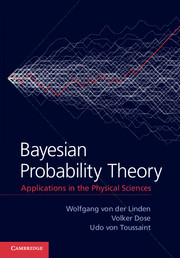Book contents
- Frontmatter
- Contents
- Preface
- PART I INTRODUCTION
- PART II ASSIGNING PROBABILITIES
- PART III PARAMETER ESTIMATION
- PART IV TESTING HYPOTHESES
- PART V REAL-WORLD APPLICATIONS
- 21 Regression
- 22 Consistent inference on inconsistent data
- 23 Unrecognized signal contributions
- 24 Change point problems
- 25 Function estimation
- 26 Integral equations
- 27 Model selection
- 28 Bayesian experimental design
- PART VI PROBABILISTIC NUMERICAL TECHNIQUES
- Appendix A Mathematical compendium
- Appendix B Selected proofs and derivations
- Appendix C Symbols and notation
- References
- Index
25 - Function estimation
from PART V - REAL-WORLD APPLICATIONS
Published online by Cambridge University Press: 05 July 2014
- Frontmatter
- Contents
- Preface
- PART I INTRODUCTION
- PART II ASSIGNING PROBABILITIES
- PART III PARAMETER ESTIMATION
- PART IV TESTING HYPOTHESES
- PART V REAL-WORLD APPLICATIONS
- 21 Regression
- 22 Consistent inference on inconsistent data
- 23 Unrecognized signal contributions
- 24 Change point problems
- 25 Function estimation
- 26 Integral equations
- 27 Model selection
- 28 Bayesian experimental design
- PART VI PROBABILISTIC NUMERICAL TECHNIQUES
- Appendix A Mathematical compendium
- Appendix B Selected proofs and derivations
- Appendix C Symbols and notation
- References
- Index
Summary
The problem of estimating values of a function from a given set of data [yi, xi} is a generalization of the well-known and much simpler problem of interpolation. In interpolation we infer the values of a function f(x) which takes on the values yi = f(xi) at the pivotal points {xi} at arguments x between the pivots, xk ≤ x ≤ xk+1 ∀k. The interpolation problem becomes a function estimation problem if the data yi which are regarded as samples from the function f(x) at argument xi are deteriorated by noise. In this case we must abandon the requirement yi = f(xi) and require the function to pass through the given data {xi, yi} in some sensible optimal way. We distinguish two categories of function estimation. In the first category the function f(x) is a member of the class of functions f(x∣θ) parametrized by a set of parameters θ. The simplest of these curves is a straight line passing through the origin of the coordinate system whose single parameter is the slope. Parametric function estimation amounts in this case to the determination of the single parameter ‘slope’. This kind of function estimation is formally identical to the previously treated parameter estimation and regression. In this chapter we shall therefore only deal with the second category, nonparametric function estimation.
Information
- Type
- Chapter
- Information
- Bayesian Probability TheoryApplications in the Physical Sciences, pp. 431 - 450Publisher: Cambridge University PressPrint publication year: 2014
